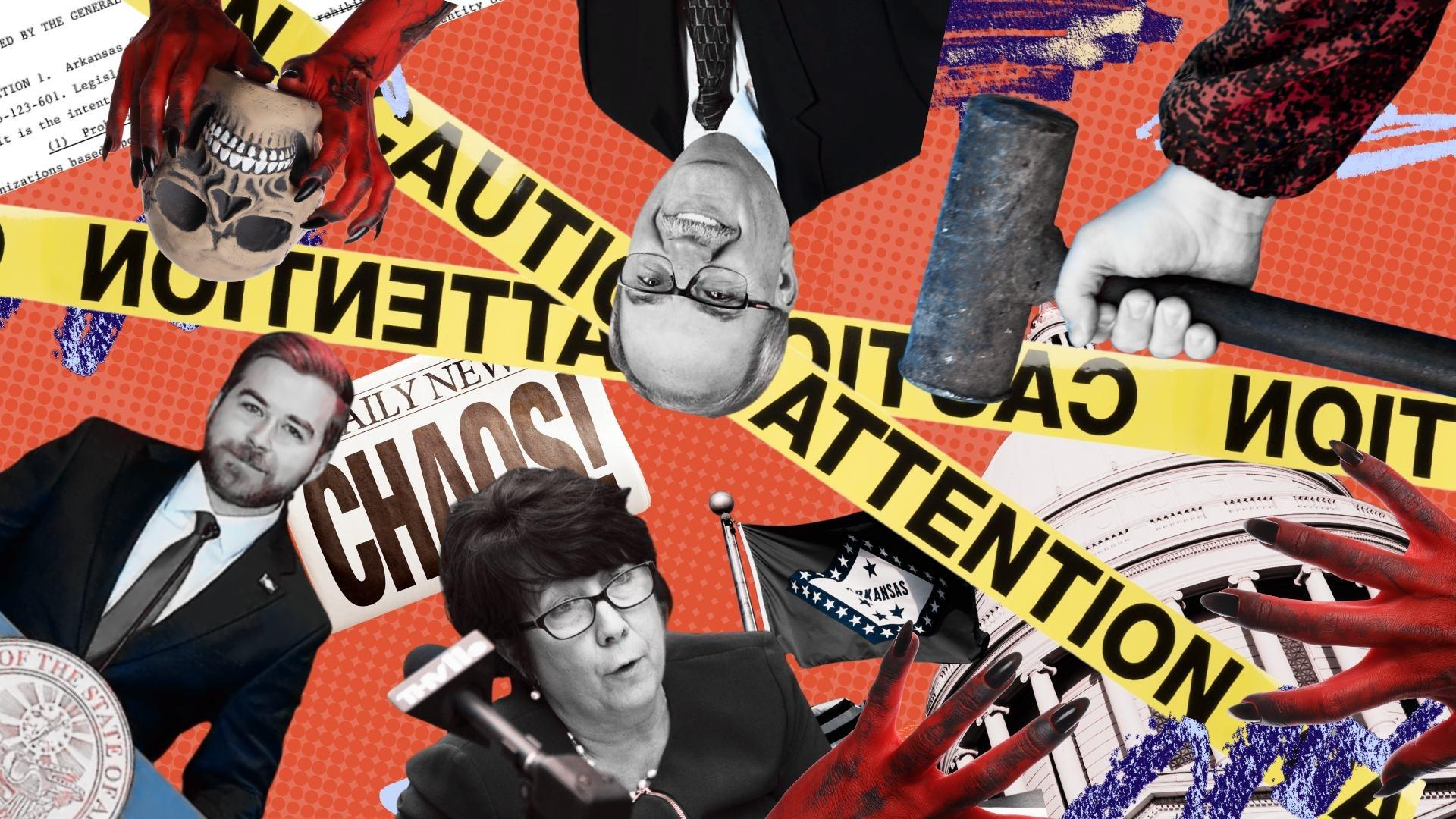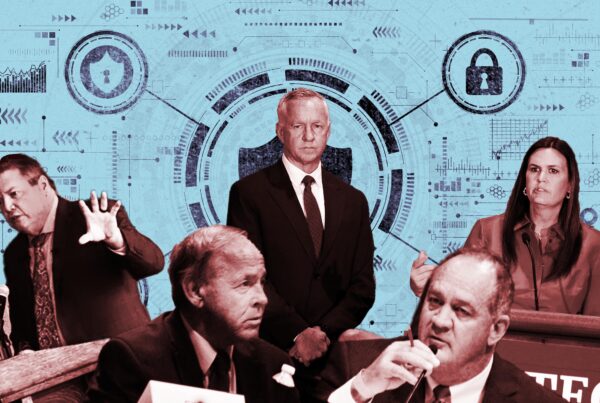With lawmakers taking a spring break, it’s a good opportunity to step back from specific legislation and talk about some themes we’ve seen emerging this legislative session. After the break, legislators say they’ll have about two and a half weeks of working time left, so these themes are likely to guide the final rush of legislation: direct democracy, (a lack of) government transparency, centralizing state control, and culture war stupidity.
Direct Democracy
Kim Hammer’s best efforts have functionally foreclosed the citizen-led ballot initiative process. Five of his six bills attacking our constitutional right to put things on the ballot have now been signed into law by Governor Sanders. Grassroots groups now have basically no chance to bring policies to their fellow Arkansans.
These aren’t the only bills restricting our rights to the ballot and the political process, either; David Ray passed HB1222, which gives the Attorney General carte blanch to reject ballot titles; Ryan Rose wants to “simplify” ballot titles by requiring them to be at an 8th grade level (no similar restriction on legislatively proposed amendments, naturally); and Arkansas ACCESS even bans students’ right to speak out about policies that directly affect them.
Why the rush to do this? The legislature has certainly been steadily attacking the direct democracy process for the past dozen years, but until now, they’ve mostly nibbled around the edges: adding paperwork requirements, making ballot titles more difficult to write, and increasing the number of counties needed to qualify for the ballot (this last one is unconstitutional! But who’s counting?) So why now?
Because, despite all these roadblocks, the Arkansas Abortion Amendment almost made it. It took the full opposition of all three branches of state government to stop the people having their say last fall. Legislators are terrified of that kind of people power, so it must be removed, despite the unconstitutional nature of these bills.
Sen. Greg Leding posted a few weeks ago that he doesn’t believe these legislators are scared of the people; the people haven’t shown legislators they’re going to be held accountable. The number of people who showed up to speak against these bills shows that Arkansans are watching, but until the next election, the best thing we can do is organize together and get ready instill some good old-fashioned fear of the voters’ power in our legislators.
Government Transparency
The Sanders administration has never been the biggest fan of government transparency, and with a few exceptions, the legislature has followed her lead. A quick shoutout to one of the few good bills this session: Sen. Clarke Tucker’s SB227, which clarifies the definition of “public meeting” under the Freedom of Information Act.
But this isn’t just about the laws; it’s about procedure during session that aims to limit public participation in the process.
Take Blake Johnson’s SB84/SB290. The bill’s bad, full stop, but having followed its progress, I’ve been floored at his distaste for the public. He’s jerked around the agenda to try and avoid facing citizens who oppose the bill, he’s added amendments at the last second (something Mary Bentley also tried to do with HB1668), and he’s been extremely unforthcoming about his future plans for the year.
Examples of this abound throughout session; lawmakers assume that the public largely isn’t paying attention and use arcane procedures to avoid facing us during committee meetings. It’s overtly disrespectful to us. From limiting testimony in committee meetings, to last minute amendments, to working around agendas, the legislature really doesn’t care that it’s increasingly hard for us to head up to the Capitol and make our opinions known.
And that’s by design. The solution?
Do it anyway. They can’t lock you out of the Capitol, and they can’t stop you calling the Senate or House switchboard and leaving pink slips (more on these in a future post), and they can’t stop you from coming to committee meetings. All that takes time – time off work, time away from family, time on the road – but it’s a huge indicator for legislators where the public stands.
Centralizing State Control
While bureaucracy sounds like a bad word, in reality it keeps inexperienced legislators away from day-to-day decision making, which I think we can all appreciate. They delegate powers like rule-making to boards and agencies so that the experts can do actual work. This is normal!
But a number of bills revolve around efforts to remove bureaucracy and rule-making so that the executive branch can circumvent those important processes. Take ACCESS, Sanders’ higher education omnibus; while most public testimony focused on students’ free speech rights and the provisions allowing professors to be easily dismissed, the bill also removed a huge number of board seats from various agencies related to education. Almost all these seats were designated for minority groups – people of color, rural educators, and other underrepresented folks. Now, the Governor gets to appoint friendly faces to these boards.
Dan Sullivan’s efforts to hamstring the State Library Board and Arkansas PBS are more good examples. Both are independent organizations, and rightfully so; libraries and public broadcasting represent bastions of free speech. Under Sullivan’s bills, however, the Department of Education would directly control them, creating a situation rife with First Amendment pitfalls. It’s a lot easier to prevent PBS from airing accurate historical programs or the Library Board from protecting the rights of libraries when you control those governing bodies.
Even the notorious – and hopefully dead – Baby Olivia Bill shows a similar drive for centralized control. Instead of allowing school districts to make their own decisions about what’s best for students and families, it would have mandated one specific video be shown to all students across the state. Again, the Department of Education gets to decide what school districts can do.
Speaking of “local control,” there’s also been a push to change zoning laws across the state in ways that are friendly for short term rentals and hostile to affordable and available housing. Brit McKenzie seems to have been at the forefront of a lot of these bills, though HB1790 failed in committee last week. However, Sen. Jim Petty joined the party last week with SB456, which removes practically all local zoning authority from municipalities and cities.
It’s not like there’s a massive housing crisis in Northwest Arkansas or anything.
Pointing out the hypocrisy of these anti-local control bills doesn’t do a whole lot, but it’s worth noting. These people really don’t care about solving problems facing ordinary Arkansans. The reason local control is important is because it’s at the local level that we can best influence our elected officials and work with them to solve these kinds of everyday problems. By centralizing state control, Sanders and her legislative cronies remove those options.
Culture War
We all knew it was coming, didn’t we?
If the 2023 general legislative session was about seeing how far they could push the envelope, this session seems to be about blowing past any semblance of sanity and seeing what they can get away with. Just like in 2023, Mary Bentley and Dan Sullivan are responsible for the largest numbers of these bills.
The obvious first place to start? Sullivan’s anti-DEI screed, SB3. You can read about the downstream effects of this legislation here, but ACCESS also has a number of anti-DEI provisions; students famous for political activism, like Little Rock Central High, are now no longer able to exercise their free speech rights. Boards with seats set aside for minority groups to ensure their voices are heard have been cut.
We already mentioned Baby Olivia above, but last week Bentley was back at it with HB1668, which tries to ban “social transitioning” for minors and lets them sue anyone who attempted to assist in that “social transition” up to twenty years after the event. The committee meeting ended with Bentley pulling the bill down after the Attorney General’s office stated they couldn’t successfully defend the bill in court.
Predictably, this isn’t the only anti-LGBTQ bill making its way through committee. SB486 passed out of Senate State Agencies last week, sponsored by Sen. Blake Johnson and (surprise!) Rep. Mary Bentley. It would restrict bathroom usage in state-funded facilities by trans and nonbinary folks. This is obviously unconstitutional (indeed, during discussion on HB1668, Rep. Ashley Hudson noted that a lot of Bentley’s culture war legislation from ‘23 has been enjoined by federal courts), but that certainly isn’t going to stop Bentley.
Rep. Wayne Long, meanwhile, has sponsored some legislation targeting immigrants. HB1422, which would have prohibited non-citizens from voting, failed in the House because, well, it’s uh. It’s already illegal for non-citizens to vote! This goes hand in hand with the Governor’s “Defense Against Criminal Illegals” Act, which (again) removes local control from cities that actually take “love thy neighbor” seriously.
Culture wars have always been about fear. They’re about punching down against vulnerable groups. They’re about stoking fear of the different, of the unfamiliar, to distract from the ways the legislature is taking power away from the people and lining their own pockets.
And that’s the single biggest overriding theme of the session so far. Kim Hammer is over here trying to give the office he’s running for new law enforcement powers. Sanders is bringing education and communication under her thumb, lining the pockets of her voucher friends and power company friends, all while attacking immigrants and other vulnerable groups.
Nothing about this is surprising, but the legislature had best be careful. Folks might just wake up this time around.





